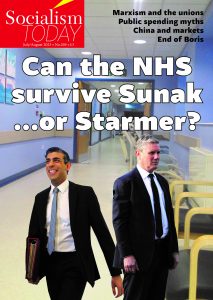
Of all the problems facing the British capitalist establishment in the summer of 2019, the “for now” departed Boris Johnson was only ever perceived to be the answer – or more accurately, part of an answer – to just one of them. The most pressing and urgent question of how to stop a Jeremy Corbyn-led government coming to power, with all the hopes and expectations so dangerous to the system that such a prospect being realised would have unleashed.
Under the leadership of Theresa May, the Conservatives – the oldest party in the world, and the political vehicle through which the capitalist class had traditionally preferred to exercise their rule – were in complete disarray. In the elections to the European parliament that had taken place on 23 May, the Tories had polled just one-and-a-half million votes, an 8.8% share, the first ever national election in which they had won less than 10% of the votes cast.
The fact that the European elections had taken place at all was itself evidence of how dysfunctional the party had become from the capitalists’ point of view. The government was obliged to stage the elections because it had been unable to meet the March 2019 deadline to agree a withdrawal treaty to leave the EU, following the 2016 referendum, due to the divisions on the Tory benches. The poll was won by Nigel Farage’s newly formed Brexit Party, with a 30.5% vote share, supporting a ‘no deal’ exit.
Read more